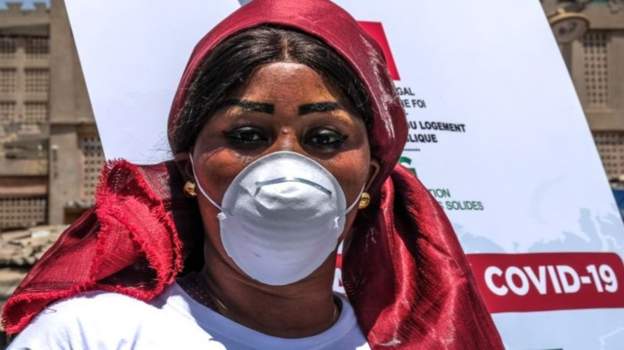Senegal has cancelled giant celebrations to mark its 60th anniversary of independence from France because of coronavirus.
The West African nation has 140 active cases of Covid-19 - 66 people have recovered and one person has died over the last month.
It has become one of the countries in Africa leading the fight against coronavirus.
As well as declaring a state of emergency, closing its land, air and sea borders to all but essential goods traffic and banning public gatherings, it has focused on tracking potential infections.
Anyone who has been in contact with an infected person has been put up in a hotel and quarantined for 14 days.
The mantra of the World Health Organization (WHO) is “test, test, test” - but tests are time-consuming and expensive, something Africa can ill afford.
That all may be set to change as Senegal is working with a UK company to develop a quick, simple, $1 (£0.80) test.
Validation tests are under way.
As the test can be performed without any need for electricity, it would be of particular use for Africa’s rural communities, which often do not have access to power.
More controversially, Senegal has been pioneering the use of an anti-malarial drug, chloroquine, to treat coronavirus patients.
The WHO says its effectiveness has not been proved; other respected medical institutions have warned against the hype surrounding the drug.
But Abdou Latif Coulibaly, Senegal’s culture minister and government spokesman, told the BBC that doctors in the country had seen what he described as “rapid improvement” in patients treated with chloroquine.
“The WHO is not going to tell us what to do,” he insisted.
“Our doctors can do what they want.”
Although with nearly 8,000 confirmed cases across the continent, Africa has not yet been hit as hard as other places there are fears that if and when Covid-19 takes hold, it will be a catastrophe.
Initiatives such as the cheap test Senegal is developing will be essential in saving lives on a continent with weak healthcare and sanitation systems, and populations often vulnerable to disease because of underlying conditions such as malnutrition, tuberculosis and HIV/Aids.
Latest Stories
-
Slim and Fit Ghana donates to kids at Motherly Love Orphanage in Kwabenya
12 minutes -
We’ll be reorganising ourselves for the battles of tomorrow – NPP
16 minutes -
Ghanaian teacher Morkporkpor Fiador’s GWR Read-A-Thon attempt postponed
25 minutes -
Revocation of licences of UT, Capital banks were strict requirements from IMF – Dr. Addison
26 minutes -
MP Cynthia Morrison among 280 members expelled by Agona West NPP
35 minutes -
NPP to set up committee to investigate 2024 election defeat – Stephen Ntim
52 minutes -
New Juaben North NDC executives intercept 24k bags of fertiliser at Koforidua
2 hours -
Luigi Mangione pleads not guilty to murdering healthcare CEO
2 hours -
GhLA opens applications for 2nd Edition of Youth Advocacy Challenge
2 hours -
Remote Work in Africa; the Doballi solution
2 hours -
Stephen Ntim rallies NPP members after 2024 election loss
2 hours -
AratheJay ignites the night with mesmerising ‘Nimo Live’ debut concert
2 hours -
Diplomatic Corps in Ghana applaud Bawumia
2 hours -
Drought hits over 58,700 hectares of crops in Oti Region
2 hours -
Stakeholders advocate waste recycling to drive economic empowerment at Recycle Up! Ghana 10th anniversary
3 hours

